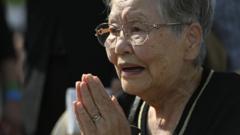Hiroshima's 80th-anniversary memorial highlights the ongoing nuclear threat and urges global action against weapons of mass destruction.
Remembering Hiroshima: 80 Years Since the Atomic Tragedy

Remembering Hiroshima: 80 Years Since the Atomic Tragedy
A moment of reflection as Japan honors the lives lost in Hiroshima's atomic bombing.
On Wednesday, Hiroshima commemorated 80 years since the tragic event when the United States dropped an atomic bomb on the city, an act that forever altered the course of history. In a solemn ceremony held at the Peace Memorial Park, members of the global community gathered, including Japanese Prime Minister Shigeru Ishiba, to pay respects to the victims of this devastating attack. “Japan stands alone in having experienced the horrors of an atomic bombing during warfare,” remarked Hiroshima Mayor Kazumi Matsui, emphasizing the nation’s commitment to peace.
The repercussions of the dual bombings of Hiroshima and Nagasaki resulted in the deaths of over 200,000 people due to the immediate impacts as well as subsequent radiation exposure. Among those affected was Hiroshima survivor Shingo Naito, who recalled harrowing memories of loss and trauma relating to the day of the bombing, which took his father’s life and caused severe injuries. Today, he engages with students by turning his painful experiences into artistic expressions as a form of storytelling.
In light of the anniversary, Mayor Matsui highlighted a pressing concern regarding the global military escalation and growing justification of nuclear arsenals for national defense. He accused world leaders of neglecting the historical lessons learned from nuclear tragedies. Matsui insisted that the nuclear Non-Proliferation Treaty faces a critical juncture and urged Japan to endorse the Treaty on the Prohibition of Nuclear Weapons, which took effect in 2021. This initiative, championed by over 70 countries, has been met with resistance from nuclear-capable nations, including the U.S. and Russia, as well as Japan itself, which relies on U.S. nuclear deterrents for its security.
Activism around the nuclear issue remains prevalent, with protests advocating for disarmament popping up in the vicinity of the memorial site. Saitoshi Tanaka, another survivor, voiced that current conflicts around the globe, including the ongoing violence in Gaza and Ukraine, resonate deeply with his traumatic experiences. He called for widespread outrage and mobilization of citizens against the presence of nuclear weapons, stressing that the imminent threat they pose demands urgent action from global leaders.
The repercussions of the dual bombings of Hiroshima and Nagasaki resulted in the deaths of over 200,000 people due to the immediate impacts as well as subsequent radiation exposure. Among those affected was Hiroshima survivor Shingo Naito, who recalled harrowing memories of loss and trauma relating to the day of the bombing, which took his father’s life and caused severe injuries. Today, he engages with students by turning his painful experiences into artistic expressions as a form of storytelling.
In light of the anniversary, Mayor Matsui highlighted a pressing concern regarding the global military escalation and growing justification of nuclear arsenals for national defense. He accused world leaders of neglecting the historical lessons learned from nuclear tragedies. Matsui insisted that the nuclear Non-Proliferation Treaty faces a critical juncture and urged Japan to endorse the Treaty on the Prohibition of Nuclear Weapons, which took effect in 2021. This initiative, championed by over 70 countries, has been met with resistance from nuclear-capable nations, including the U.S. and Russia, as well as Japan itself, which relies on U.S. nuclear deterrents for its security.
Activism around the nuclear issue remains prevalent, with protests advocating for disarmament popping up in the vicinity of the memorial site. Saitoshi Tanaka, another survivor, voiced that current conflicts around the globe, including the ongoing violence in Gaza and Ukraine, resonate deeply with his traumatic experiences. He called for widespread outrage and mobilization of citizens against the presence of nuclear weapons, stressing that the imminent threat they pose demands urgent action from global leaders.



















